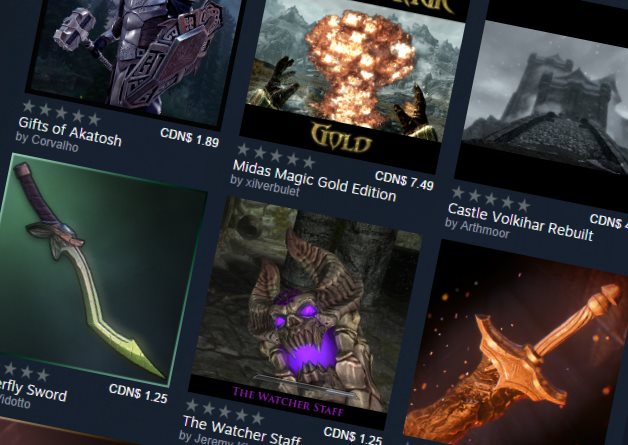
Evan Lahti: The past week illuminated one of Valve’s biggest weaknesses: communication. Skyrim was an ambitious choice for a paid modding program, but a very hard one to pitch PC gamers on, considering how much time Skyrim’s community has had to mature, and the intricate web of co-dependence that some of its mods weave.
I still believe that paid modding in some form is a positive evolution of the scene and our hobby. We cannot go on as a society expecting so much of our creative work to be done for free. Images are just one ever-present example of this. Pro photographers travel around the world and spend thousands of dollars or hours or weeks capturing wildlife, conflict, and other subjects only to have garbage Twitter accounts and aggregator middlemen like Imgur post their work in a way they can’t profit from, totally uncredited. We have huge systems that distribute and value the work of talented people but those same systems don’t reward or often even attribute the work to them.
It’s just and necessary for modders to eventually have the option of selling their work. I really hope the entirety of PC gaming is on the same page about that. The details of such a system are up for debate, and we should continue to talk about them, just as we (and PC gaming at large) did for Greenlight and continue to do for Early Access. And as continues to be the case with those Steam programs, blunders can and will happen if paid modding returns. Someone will steal content from a game, hide it in a mod, and publish it. It’s already happened in CS:GO, and when it happens again there’ll be a big uproar, policies will be changed, and that’ll hopefully be one of the last instances. But the inevitable abuse of a system doesn't invalidate the good that that system will do.
We should want modders to have the capacity to become millionaires. We should want kids in Germany, in Korea, in Mexico, and everywhere to have a chance to get experience publishing stuff and making money in games, lest their parents tell them to “get a real job,” depriving them of the chance to become the next Kim Swift, Cliff Bleszinski, or Garry Newman. Paid modding has the capacity to become the hotbed for the next generation of game creators.
Wes Fenlon: I don’t know what I’m more bummed about: Valve making such a mess of this paid mods rollout, or the community reacting short-shortsightedly and negatively. The mob mentality is so tiresome. A new thing happens that the Internet decides is terrible, and thousands of people work themselves up into a frenzy to stop it in a righteous holy crusade. Valve screwed up this launch, no argument there. But if you’re against the very idea of paying for mods, I think you’re belittling the effort and passion that goes into modding projects, and you’re probably the kind of person who whines when a smartphone app costs more than $1.
I want to see Valve spend a couple months rethinking this and getting it right. And getting it right is going to require some experimentation. They should relaunch with the intention of getting community feedback, adjusting revenue share, establishing realistic curation processes on Valve’s end and within the community. They should start fresh with a new game that’s ripe for modding, but doesn't already have a Workshop page full of thousands of mods. And Valve definitely needs to hire more people to help Steam grow and manage that growth, because it’s clear that they don’t have enough people on customer support or the numbers to curate thousands of mod submissions.
What I hope to see is a new golden era of mod support in PC games large and small. It’s a very real possibility, and it’s why I think everyone making the argument “Modding is a hobby, and it should be free forever!” is standing in the way of exciting progress. If publishers like Ubisoft see profits in supporting mods in historically locked-down games like Assassin’s Creed, mod support could suddenly be a priority. And if independent developers can make more money on their games simply by supporting mods, they benefit, modders benefit, and the entire ecosystem of PC gaming benefits. Imagine virtually every PC game embracing modding with open arms. My god, it’ll be beautiful.
Keep up to date with the most important stories and the best deals, as picked by the PC Gamer team.

Chris Livingston: If Valve decides to re-implement this (and they will) they’re going to need to make a few changes. Most importantly, there needs to be a tweak to the payment split. I’d suggest something simple: 100% of sales goes to the modders. I know this is unrealistic—big, successful companies like Valve don’t become big and successful by shying away from profit—but it makes sense. Modders are the ones doing the work, sometimes hundreds or even thousands of hours of it, over years in some cases.
For customers, it would mean a lower price. See a mod selling for five dollars? It’s priced at five dollars because the modder knows he’s only getting to keep 25% of it. If the modders keep all the money, they’ll charge less. Lower prices mean more sales: I’d probably balk at buying a single mod for $10 but might buy dozens of mods priced at a buck apiece, similar to how I spend money on smartphone apps. If something close to 100% of the take goes to modders, the modders and customers both benefit.
Valve is already getting something out of creating and hosting the Steam Workshop: thousands of gamers spending tons of extra time on Steam. The longer someone spends on Steam, the more likely they are to buy a game. Hang around a store all day, and you’ll probably walk out with some purchases you hadn’t even planned on buying.
Developers being given a portion of the proceeds as an incentive to support mods seems silly: they already have a huge incentive and they're already reaping the benefits. Mods can greatly extend the life of a game, give it fresh content, keep people talking and writing and tweeting and YouTubing about it for months longer they otherwise would, and that continued exposure contributes to new sales of the game. Supporting mods means supporting the future of your game. Don’t take money out of modders’ pockets on top of that: they’re already doing you a huge favor.
Again, expecting 100% of sales to go directly to modders isn’t realistic. But it should be as close to that as humanly possible.
Samuel Roberts: I think content creators being paid for their work is fundamentally a good thing. If you create great mods that require hundreds of hours of legwork, I support your right to make money from doing so—ultimately you may be benefitting the game in question and everyone needs to make a living. How could anyone begrudge that?
I agree there were legitimate concerns about paid modding, particularly in terms of percentage splits between the owners of the game, Valve, and the mod creators, and how that’s been communicated. I also think there are many mods that should be free—paying can be the exception, not standard practice. But I think people should have a right to earn money from their work. Perhaps Skyrim wasn’t a good choice for breaking the scheme in; maybe a newer game would've been a better match, where a community is still in the early stages of being formed.
Maybe it could’ve led to a system that’s fairer and eventually better-received, with more flexible pay models. That this petition has a ‘confirmed victory’ on it now is very annoying to me, and I say that thinking of the creators who could’ve been making a living from this, not Valve or Bethesda who don’t need the money.
Think how much more useful the energy behind that would've been if it was channeled into challenging a more irritating trend in games, like day one DLC being promoted by an otherwise brilliant Just Cause 3 trailer half a year from release, or selling Jason Voorhees as part of a season pass shortly after the launch of a beat-’em-up. Isn't that more cynical? This was an initiative that ultimately could’ve helped people who want to improve the way you play games.
PC Gamer is the global authority on PC games—starting in 1993 with the magazine, and then in 2010 with this website you're currently reading. We have writers across the US, Canada, UK and Australia, who you can read about here.


